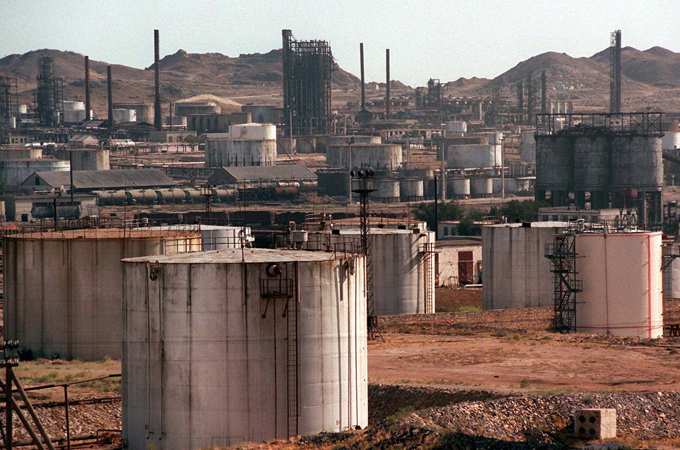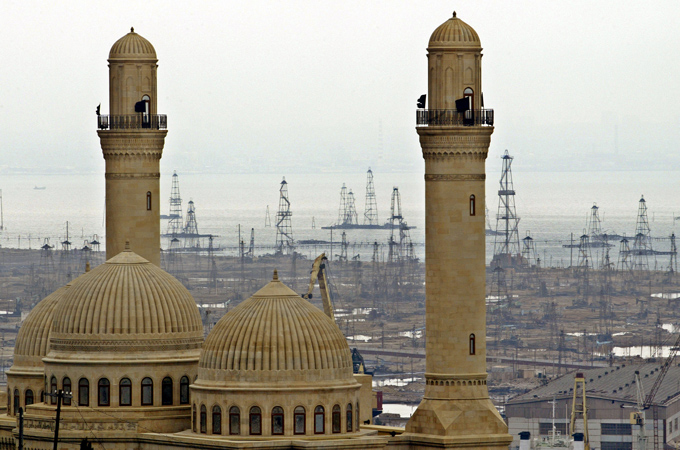China plays for energy in new Great Game
Stalled decade-long negotiations with Russia have led China to go energy shopping around the Caspian Sea.

Shanghai, China – Near the right bank of the Amu Darya River in Turkmenistan lies a sprawling complex that is the fruit of China’s decade-long charm offensive in the hermetic state.
Derricks erected in the bleak, forbidding desert extract natural gas from huge reservoirs underground. Pipes carry the gas to a plant, the largest and most advanced in Central Asia, where it is processed before being pumped more than 1,800 km east to China.
The Amu Darya gas project, as it is known, is a testament to China’s courtship of Central Asia – a region of increasing strategic and economic importance to Beijing.
China is now a player in the latest round of the “Great Game” – a tag coined by Rudyard Kipling to describe the 19th-century rivalry between imperial Britain and Russia for influence in Central Asia.
Competing with China now are Russia, Europe and the United States. China’s economic clout, though, has helped it win friends in what was once firmly Russia’s playground.
Bilateral trade between China and Turkmenistan, Kazakhstan, Uzbekistan, Tajikistan and Azerbaijan reached $46bn in 2012 – a 100-fold increase since the five sovereign states emerged from the rubble of the Soviet Union two decades ago.
Energy is mainly a commercial activity but to say that politics is not involved ... is not possible. You cannot avoid some foreign politics in energy activities.
Claiming the Caspian
China’s interest in the Central Asian states is easy to understand. Burgeoning Chinese demand for energy has led the country’s state-run oil and gas companies to waters off the Mozambique coast, the dusty Australian outback – and the shores of the Caspian Sea.
“It’s another region that they see ripe for the picking,” said Peter Kiernan, lead energy analyst with the Economist Intelligence Unit in London.
The area is rich in energy resources. BP estimates that Turkmenistan sits on the world’s fourth-largest reserves of gas. The lush valleys and snow-covered mountains of Tajikistan have also attracted both Chinese and Western companies, with one company executive claiming the country has enough gas to meet China’s demand for 24 years.
Beijing’s interest in Central Asia is about “securing diversified sources of energy supply”, said Kiernan.
“They don’t want to put all their eggs in one basket, like in the Middle East or in any particular region. So they are trying to secure diversified supplies from different parts of the world, and Central Asia is pretty crucial to that.”
As China started locking down huge quantities of Caspian oil and gas, some Western analysts and media began characterising the booming energy trade eastwards as part of a grand Central Asian energy strategy by Beijing.
Some Chinese observers dismiss that view. “I’ve heard that there could be a strategy … truly I don’t believe so. I don’t think China has a choice [over buying energy from Central Asia],” said Lin Boqiang, director of the China Centre for Energy Economics Research in Fujian province. “You have to go where the energy is. If there’s an opportunity, you’re going to see [the] Chinese, no matter where.”
In its quest for energy, China has employed much the same strategy as other countries in the world, providing billions of dollars in low-interest loans and offering to pick up the tab for major infrastructure projects.
It was Beijing’s financial largesse, for instance, that helped pave the way for an international pipeline to carry gas from the Amu Darya project to China. Built at a cost of about $7bn, the Central Asia-China gas pipeline starts in Gedaim in Turkmenistan, and winds more than 1,800km through Uzbekistan and Kazakhstan before entering northwest China.
 |
| An oil refinery in Turkmenbashy, Turkmenistan [AP] |
“The Chinese decided they wanted to build a pipeline and were willing to do it themselves,” said Kiernan. “They started the construction pretty much straight away [and] got it done in about two to three years.”
“The Chinese can do things more quickly and more directly. As long as they get the supply, then it doesn’t matter so much about the cost.”
‘Jenny on the bloc’
The lengths in which Beijing goes to win over Central Asian leaders was underscored this summer by an unlikely figure: Jennifer Lopez. The American pop star was embroiled in a human rights controversy in June, after performing at lavish birthday celebrations for the 56-year-old president of Turkmenistan, Gurbanguly Berdymukhamedov.
He has been accused of human rights violations with Turkmenistan being “one of the world’s most repressive countries” under his rule, according to Human Rights Watch.
As Lopez came in for criticism, it emerged that state-owned China National Petroleum Corp (CNPC), the country’s biggest oil producer, had invited her and other celebrities to perform for Berdymukhamedov.
Besides its chequebook and impressive Rolodex, China’s studious avoidance of discussing domestic political affairs has also helped it access Central Asia’s prized natural resources.
“The Chinese don’t worry about the internal matters of the countries that they get involved in. Issues like human rights are not really a concern. It’s strictly economic,” said Kiernan.
“Energy is mainly a commercial activity but to say that politics is not involved … is not possible,” said Lin. “You cannot avoid some foreign politics in energy activities.”
”[The
get a regular and a growing market. They know that China’s going to be an increasing buyer, whether it’s oil or gas.”]
Beijing’s generous attempts to curry favour contrast with the labouring efforts of the European Union, which pinpointed Central Asia as a potential energy supplier before China did.
Europe has been drawing up plans to bring in Caspian gas for more than a decade, under a so-called “southern gas corridor” initiative that would involve a trans-Caspian pipeline. But distances and politics means Brussels now trails Beijing in the race to tap Central Asian energy.
“There’re a lot of bilateral territorial issues that they would need to resolve before a link to Europe could ever be built,” said Kiernan, noting a pipeline would need to cross the Caspian Sea – which would then involve Russia and Iran.
“The EU is not in a position to say ‘we’re willing to build a pipeline and finance it if you agree to supply us’. There’s the commercial rationale that the Chinese don’t necessarily have to have.”
Growing ties
Chinese President Xi Jinping criss-crossed Central Asia in September, sealing energy deals and promising billions in investment on a whirlwind 10-day tour.
Xi and Berdymukhamedov inaugurated work at Turkmenistan’s giant Galkynysh gas field – the second-largest in the world. Production from the field will underpin a surge in Turkmen gas exports to China, rising by 25 billion cubic metres annually to a total of 65 billion cubic metres per year. That will cement Turkmenistan’s status as the biggest seller of gas to China.
In Kazakhstan, some $30bn of announced deals included CNPC’s $5bn purchase of a stake in the country’s Kashagan oil field – one of the world’s largest oil discoveries in decades. And in less-affluent Uzbekistan, Xi and the country’s President Islam Karimov signed deals worth $15bn in sectors including oil and gas.
For the former Soviet republics, the benefits of China’s interest are obvious. “They get a regular and a growing market. They know that China’s going to be an increasing buyer, whether it’s oil or gas,” said Kiernan.
 |
| Oil derricks in front of a mosque in Baku, Azerbaijan [AP] |
Lin agreed. “It’s a win-win situation, because they really depend on each other and it’s quite complementary.”
Beijing’s deepening energy ties with Central Asia are unlikely to have gone down well in Moscow, where the Kremlin is already concerned that Chinese influence over the Caspian is gradually eclipsing its own.
The extensive deal-making has cast doubt on Russia’s efforts to broker a mammoth gas supply deal with China. After more than a decade of talks, the two sides appeared to make tangible progress in March with the signing of a memorandum for 38 billion cubic metres every year. Progress, however, appears to have stalled on the longstanding issue of price.
As Moscow haggled over price, China extended its hunt for energy supplies to Myanmar, the Middle East, and of course Central Asia.
“They’re playing hardball [with Russia] at the moment because they can afford to,” said Kiernan. “They’ve got their fingers in different pies.”